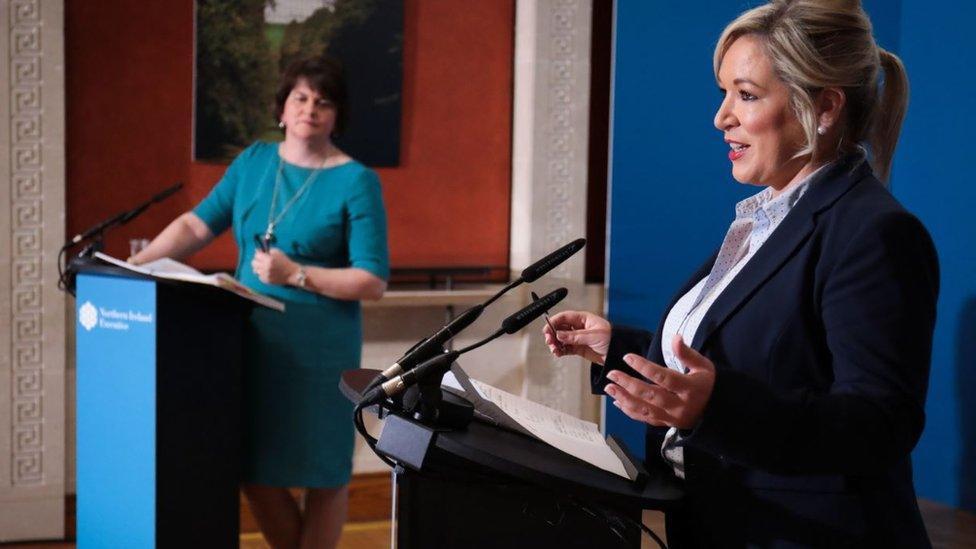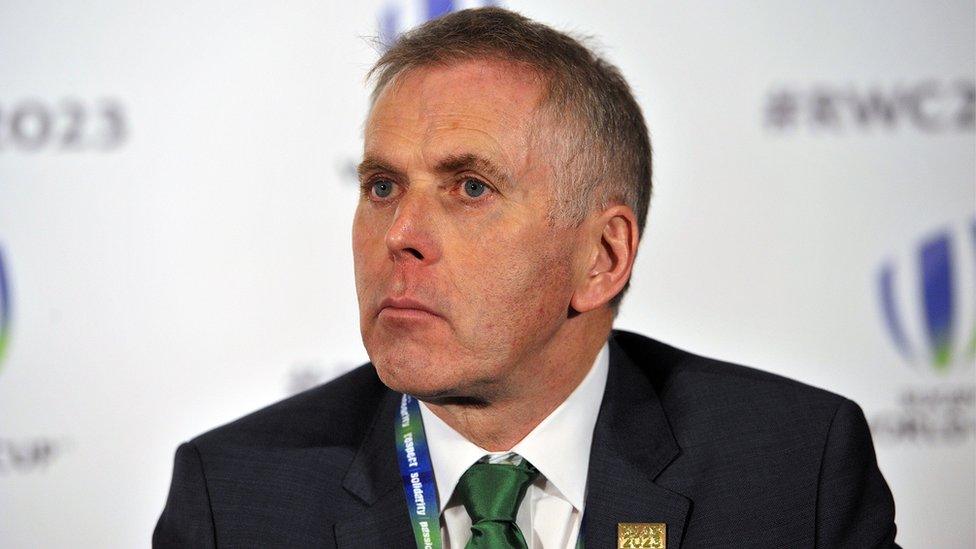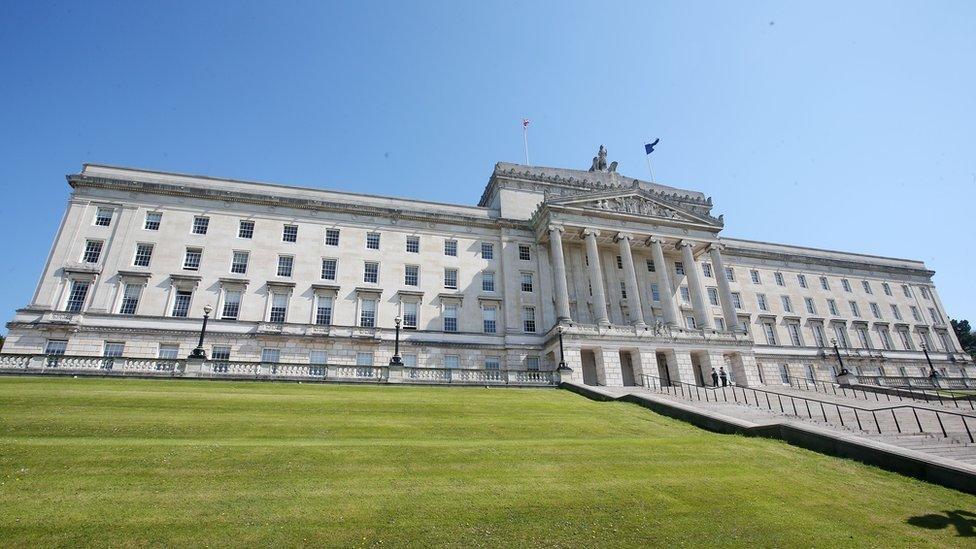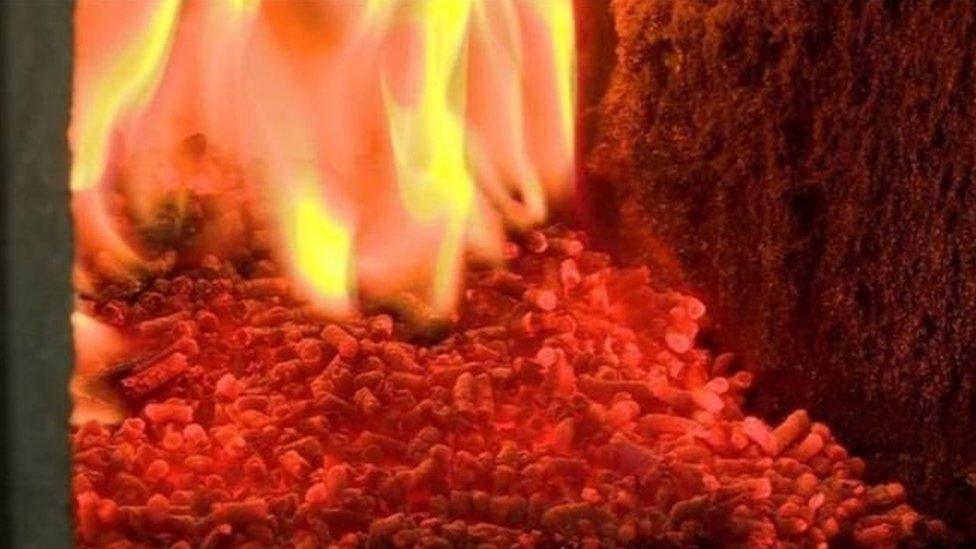Why is NI struggling to pick its top official?
- Published

Three years ago when Hurricane Ophelia lashed Northern Ireland, bringing down power lines and damaging buildings, David Sterling was at the centre of the storm.
With the stand-off triggered by the Renewable Heat scandal still continuing, it fell to the civil service chief to take charge.
He chaired the civil contingencies group which brought together the Stormont departments and the emergency services, and appeared before the TV cameras to reassure the public while advising them to baton down the hatches.
Civil servants generally prefer to shun attention, but Storm Ophelia wasn't the only time when the strange circumstances at Stormont thrust Mr Sterling into the limelight.
As the logjam dragged on, he flew to Washington DC to front the Northern Ireland Executive Bureau's St Patrick's events, putting a brave face on an administration in limbo.
Beloved Arsenal
Having kept things ticking over during the extended power vacuum, Mr Sterling witnessed the return to power sharing brokered by the then NI Secretary Julian Smith and Tánaiste Simon Coveney back in January.
However, he had made it perfectly clear he intended to stick to his plan to go at the end of August in order to concentrate on hill walking, cycling and following Arsenal, among other things.

It's not clear whether any of the three candidates were considered acceptable by one of our leaders and vetoed by the other
Should we be surprised that the advert to recruit a successor to a man in charge of 23,000 civil servants didn't appear until about six weeks before he was due to leave?
To be honest, given the executive and the assembly's track record on filling posts, the answer is probably no.
During the Stormont stand-off, the terms of the assembly's spending and standards watchdogs were allowed to expire.
A new standards commissioner is now in place, but assembly member salaries and expenses are still being handled on a DIY basis.
With Westminster about to bring in proposals which will stir the Troubles legacy hornets' nest and severely injured victims yet to receive their pensions, the first and deputy first ministers also seem to consider it reasonable to leave the victims commissioner job unfilled.
And now we have no civil service boss, after Arlene Foster and Michelle O'Neill decided they couldn't appoint any of the three permanent secretaries who made it to the final job interview.

Mr Sterling was initially appointed on an interim basis
In that final round the three candidates had to answer questions from both Mrs Foster and Ms O'Neill.
Some have raised eyebrows about the overtly political nature of this appointment, but it's not unusual to think that the heads of a government ought to have confidence in their top official.
Boris Johnson personally appointed Simon Case, a high-flying official with a track record at the Northern Ireland Office, to the top job of UK cabinet secretary.
Flash the cash?
However at Stormont it's not just one politician who has to have a hunch about who they can do business with, but two leaders with sharply contrasting views, so everything is a compromise.
It's not clear whether any of the three candidates were considered acceptable by one of our leaders and vetoed by the other, or if both Mrs Foster and Ms O'Neill were unanimous in wanting to launch another trawl.
Some sources suggest they would be keen to get a big hitter from the private sector who will shake up the civil service culture in the light of a series of lengthy delays in major capital projects and the lack of competency exposed by the Renewable Heat Inquiry.
That said, the failed recruitment process wasn't limited to internal applicants but advertised publicly.
To attract a new field of business executives with a track record of managing 20,000 plus staff in the private sector, Stormont might have to radically increase the £188,000 salary ceiling.
How would that go down with the public in these challenging economic times?

There will be other stormy times ahead for the new head of the civil service, whoever it may be
Currently executive meetings are being chaired by Stormont's Brexit specialist Andrew McCormick.
Both he and David Sterling competed for the top job when Sir Malcolm McKibbin announced his intention to leave four years ago.
And both senior officials had some difficult spells in the witness box explaining their involvement in the Renewable Heat saga.
With the pandemic still raging and the end of the Brexit extension period looming, the time between now and the next Stormont election could prove very tough.
Whoever is the new interim chief may have to put talk of revolutionising the civil service on hold and settle for surmounting the immediate challenges.
And they could be there for a while - after all Mr Sterling himself got the job, initially, on an interim basis.
Get in touch
If you have any questions either about the future of the civil service, or wider developments regarding Covid-19, Brexit or any other topical issue please submit them for our next edition of Inside Politics Q&A.
Our vodcast will feature politicians from East Londonderry including the former Justice Minister Claire Sugden, Sinn Fein's Caoimhe Archibald, the DUP's Maurice Bradley and an SDLP representative yet to be confirmed.
You can send us your questions by emailing Inside.Politics@bbc.co.uk or tweet them using our hashtag #bbcip
- Published24 September 2020

- Published14 September 2020

